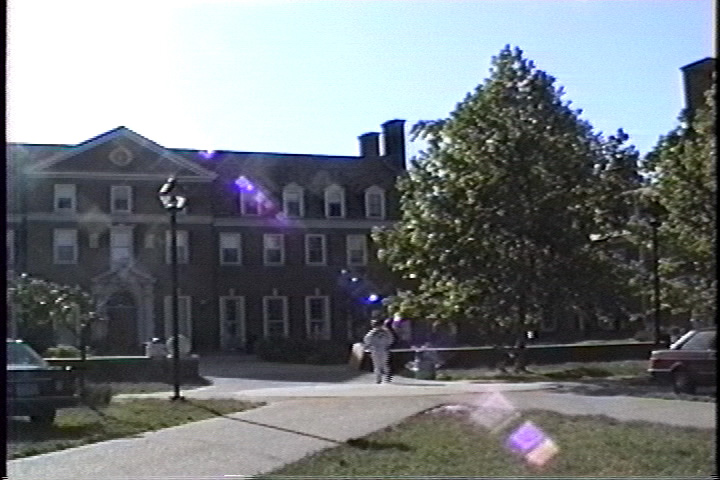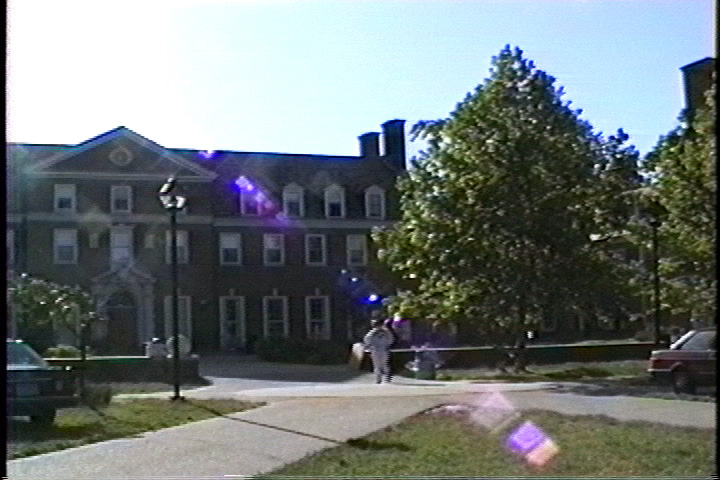I couldn't remember my old login name or email address so I had to create a new account. Around the early part of last year I was very active here in trying to figure out how to capture my Video8 and Hi8 footage. I narrowed in on two choices,
1. A top-notch Hi8 deck (Sony EV-S7000) connected to a ATI Theater 550 and capturing losslessly to huffyuv.
2. A top-notch Digital8 camcorder (Sony DCR-TRV820) digitizing the tapes to DV-AVI and uploading to my PC via firewire.
I agonized over which to choose.... going back and forth, back and forth, finding strengths and weaknesses to both. Then in the interest of just getting it done, I did what any compulsive person will do. I bought both, and captured everything via both methods. I saw differences in the captures but couldn't quantify which was "better" so I decided to simply keep both until I had more time to decide.
So here I am, six months after I sold the equipment I'd bought to capture all this stuff. I have two copies of everything, one in each format, and it's eating up over a TB of disk space. Obviously, I've got to do something about it
I'd like some *general* advice on how to choose which source to go with. If you have captured the same video using two different capture methods, how do you evaluate which was the best one? What do you look for? How would you get started?
This part is the lossy step (potentially tossing away an entire capture method for good) so I'd like to make sure I've prepared myself suitably to make the decision.
I need the disk space back so what I'm hoping to do is identify which is better (audio and video-wise--and it's possible that the best capture varied from one method to the other depending on tape--each did a different job of handling damaged video) then cut out the garbage and simply encode the result to something with better compression and still a ton of quality (one of the h264/VC1 type variants).
+ Reply to Thread
Results 1 to 18 of 18
-
-
I'm curious to see what you think of the two results. Can you post some samples?
I have an ATI 550 Pro + an ATI AIW + Digital8's + MiniDV with pass through + ADVC-100. I'm still searching for "best" capture method. I won't bias your comments, just listening. -
I'll start getting samples up. I'm on a new computer now and just now grabbing virtualdub, codecs, and so forth and am a bit rusty

I know not many have done this before so I'm not asking which is the best method. What I'm hoping to get a discussion going about is, what parameter should one look for when making such a decision, and what is the best way to evaluate source material according to those parameters? For example, I would imagine that resolution, noise, video smearing, sound quality, etc., are all things I want to look for when evaluating two AV files that came from the same analog source. But, how do I evaluate them except by eyeballing them? -
Ok, let's try some examples! Not the best examples surely - I think the video streams are some ms off from each other (but pretty close) and this actually is just Video8 footage (don't have as much Hi8 stuff so I'll have to look for it). By the way these are max quality JPGs - beware!
If you look closely it looks like EV-S7000 is adding some kind of shadow to everything. It's almost as though the luma and chroma channels are not quite in sync. I think this gives the Digi8 capture more horizontal resolution. The Digi8 also captures some extra rows on the top and bottom that the EV-S7000 can't (color loss on the top, crop on the bottom). The EVS7000 does seem to bring out more color; the TRV820 does better with shadows though. Your thoughts?
EV-S7000:

TRV-820:

-
Another: here, the EV-S7000 is much much darker than the Digi8 capture. Note some shadows/ghosts in the blue sky to the right of the big tree on the deck capture. Note that the Digi8 doesn't have this shadow, however it does have some streaking going on.
By the way - I did all my captures with DNR turned off for both decks. I found that it didn't work particularly well either either--the EVS7000 lost detail and the 820's DNR appears to be broken (no difference). TBC was ON for the EVS7000 (made a nice positive difference) and OFF for the Digi8 (did terrible things to the image).
EV-S7000:

TRV820:

-
They handle damaged tape differently too. In my experience, the Digi8 was quite superior across the board. It often got a few more seconds of usable video.
EVS-7000:

TRV820:

-
The EV-S7000 has tons of chroma noise issues. Yuck. The first image clearly shows red/blue flecks in the image. The latter images have some luma issues too, causing dark and muddy videos. Barf.
The TRV820 is clearly superior here. But the image is still not perfect. I suggest a proc amp be added beforehand. (Although it's too late since you sold everything.)Want my help? Ask here! (not via PM!)
FAQs: Best Blank Discs • Best TBCs • Best VCRs for capture • Restore VHS -
Well IMHO, the TRV820 looks better from the detail point of view - compare the brickwork in the first picture. However I am not 100% convinced by the contrast / saturation in either so would have play with those settings using the TRV820 source. I had a 20 second play with photoshop and got this which I would be happier with. Below is your original and then my altered one.

-
Altered one:
Submitted message before adding 2nd image (oops!)
Nick

-
Thanks for the feedback. I agree lordsmurf the chroma noise in the EV-S7000 is remarkably bad. I did leave the DNR turned off as it softened details considerably; I am certain it would have addressed some of that noise. My thinking was that I'd rather use a plugin like neatvideo to reduce noise, than potentially lose resolution during the capture. I thought about using a proc amp and did a great deal of research on it, even going so far as to bid on a few I saw on eBay. However proc amps would rely a bit too much on my eyesight to adjust things and I'm not sure mine is always the best. I also figured that the capture format has enough dynamic range that most proc amp-type adjustments probably could be implemented digitally. How much dynamic range is there in Hi8 or SVHS footage anyway?
Nick1977, thanks for the reply and photoshop adjustment. I agree that a little leveling, saturation, and NR/sharpening would probably do this video some good. I too liked the TRV820 footage better, however the EVS7000 did bring out a little more color that really comes out on a nice color-calibrated display. I'm assuming that there's enough dynamic range in the TRV820 capture to make the necessary adjustments in post-processing.
I'm also hoping to hear from edDV, especially his nice sony vegas charts! I actually have downloaded Vegas Trial to see if I can pull up the same diagrams and try to understand them, however I can't find them in the version I downloaded (Vegas Movie Studio Platinum 7.0 Trial). Grr. -
I'm busy now but will objectively (test tools) look closer soon. I just got back from a 2 week trip.
Recommends: Kiva.org - Loans that change lives.
http://www.kiva.org/about -
Is it possible to clean up the chroma noise that the EVS7000 put out? I've been examining many more captures and most of them have a fair amount of it. It's largely absent in the Digi8 captures. If it's a pain to clean it up, then I will feel more comfortable justifying the deletion of 800GB of EVS7000 captures. It seems that there's nothing the EVS7000 captured that the Digi8 was unable to capture.
-
I examined most of the footage and it seems that the EVS7000 (across the board) captures less detail and throws in more noise than the Digital8 camcorder does for both Video8 and Hi8. The above pics are representative. The Digi8 also managed to pull sound (in addition to video) out of damaged tape more impressively than the Hi8 deck. At this point I'd probably recommend the Digi8 camcorder for capturing Hi8 and Video8 material. It's easier, the quality is better, it's cheaper and DV is perfectly suitable for this kind of duty.
I'm probably going to toss out my lagarith captures from the deck shortly
-
Digital8 is best for transferring 8mm or hi8 tapes (I have a trv740), but I dont understand why you would want the DNR and TBC off.
May as well use a hi8 cam if you dont want those features.
But then again its up to you and your preference. -
I didn't find any benefit to either feature after extensive cross-testing. As I recall, at least on my TRV820, the DNR is flat-out ineffective (is it disabled for simple DV capture of V8 or Hi8?) - either my model was broken or DNR doesn't do anything when capturing DV out of analog tape.
As for TBC, I found that it messes up my picture... color shifts and other maladies. There are some posts here and elsewhere about the same... not many but a few. Moreover, for whatever reason, I get perfect captures even with the in-camera TBC off. -
Not anymore, no. Not effectively, anyway. You can run it through the VirtualDub filter for chroma noise, but you'll probably just add new errors in the process. It's not an archive-quality filter by any means.Originally Posted by sphinx99Want my help? Ask here! (not via PM!)
FAQs: Best Blank Discs • Best TBCs • Best VCRs for capture • Restore VHS
Similar Threads
-
DVDAuthorGUI - Question about spu begin/end
By ilmc92 in forum Authoring (DVD)Replies: 2Last Post: 10th Dec 2011, 07:37 -
Which format to begin with for YouTube downloads?
By Daniel_B. in forum Newbie / General discussionsReplies: 4Last Post: 26th Oct 2011, 01:01 -
First Blu Ray Disc : Troubles begin
By themaster1 in forum DVD & Blu-ray WritersReplies: 2Last Post: 15th Mar 2010, 16:15 -
MPEG2's @ 18,000 Bitrate - Need To Chop & Shuffle. Where To Begin?
By EViS in forum EditingReplies: 1Last Post: 17th May 2008, 12:43 -
Invert/move, the End to the Begin in one clipe MPEG, avi
By arturjose in forum Video ConversionReplies: 2Last Post: 8th Jun 2007, 17:09




 Quote
Quote
